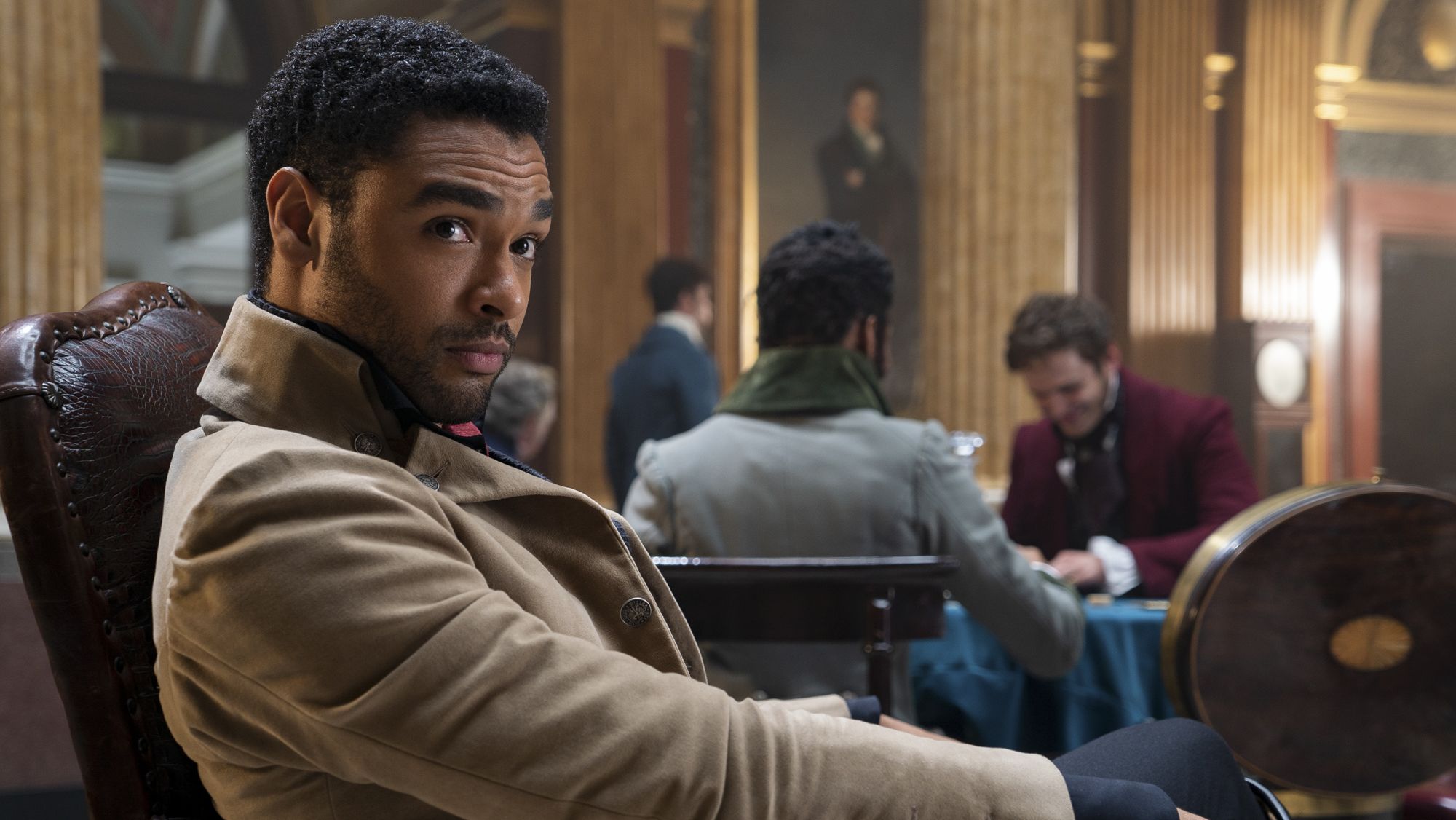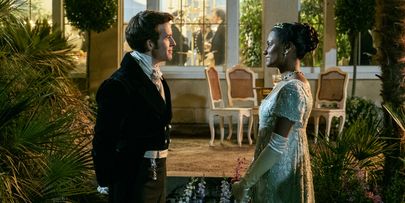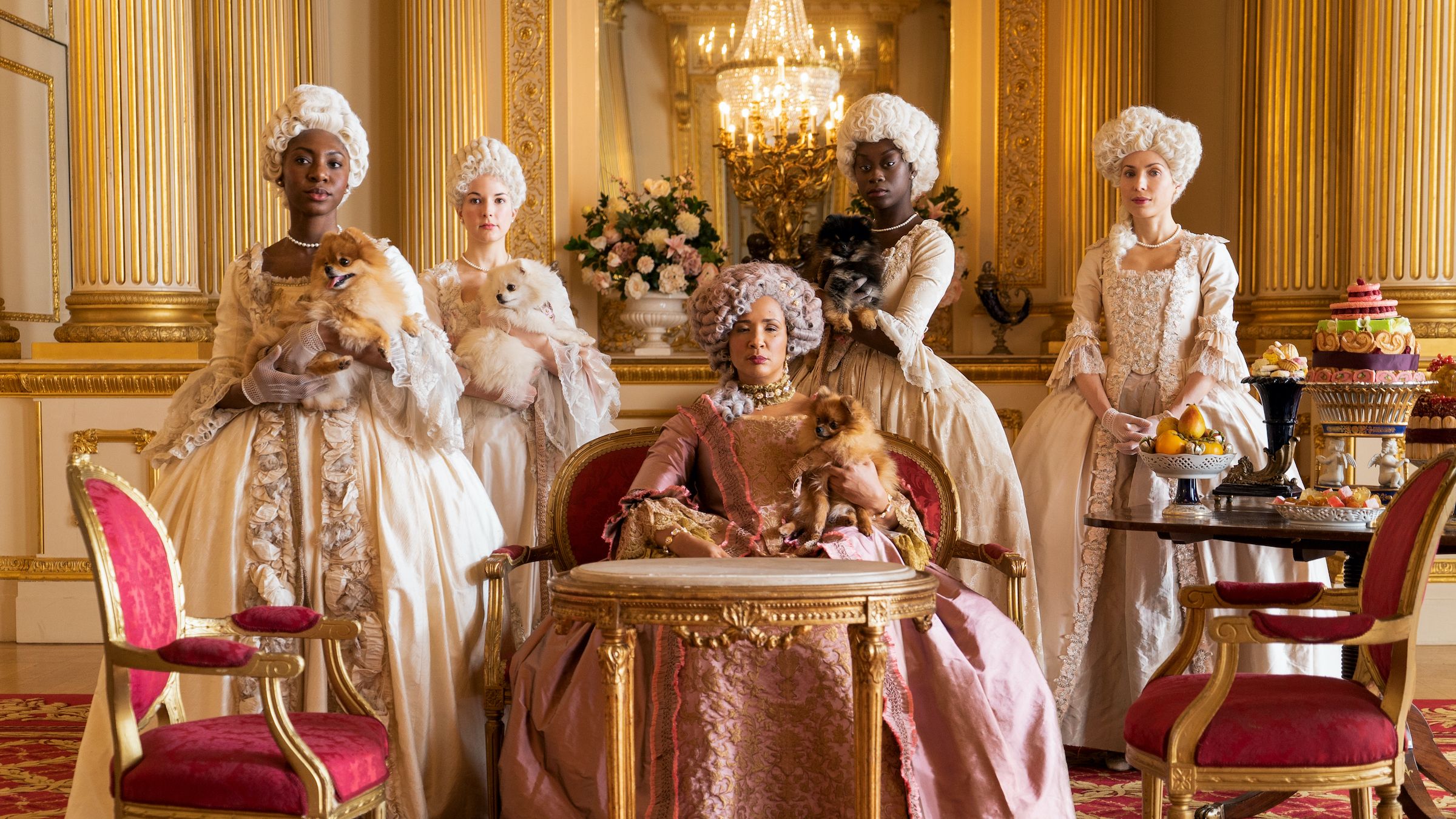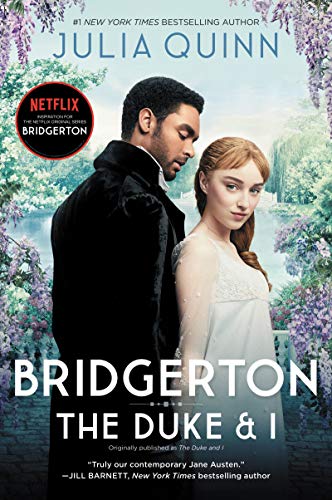Who Is Regé-Jean Page, ‘Bridgerton’s' Breakout Star?
From how to pronounce his name to why he's a romantic at heart IRL.

If you're anything like us, your holiday break obsession has been Bridgerton, Netflix's amazing, bingeable, escapist series from TV queen Shonda Rhimes (it's part of her epic, eight-series development deal with Netflix). The series, based on Julia Quinn's beloved Regency-era romance novels, follows Daphne Bridgerton (played by Phoebe Dynevor), the oldest daughter in the eight-child Bridgerton family, who enters into a pretend engagement with Simon Basset, the Duke of Hastings, played by your newest forever crush, Regé-Jean Page.
And that brings us to the point of this post: Collectively obsessing about Regé-Jean Page. The 30-year-old actor is the hit show's undeniable breakout star and a gorgeous specimen of human attractiveness—both on- and off-screen. If every part of your body tingles and flutters with butterflies every time you see Page on your screen (or Google photos of him...or Instagram stalk him...or just think of his perfect face and mischievous eyes), then you've come to the right place. Here's everything you need to know about Regé-Jean Page, aka Simon Basset, aka the Duke of Hastings, aka quite possibly the best bright spot of 2020.
He's personally explained exactly how to pronounce his name.
Learning the proper pronunciation of people's name is just good manners and decent human interaction, and Page has made it easy for anyone unsure of how to pronounce his. He cleared up any potential confusion in a 2017 tweet, explaining that it's "Regé as in reggae, Jean as in Wyclef."
PSA: Regé as in reggae, Jean as in Wyclef, Page as in... um 📙 I guess? 🤔 https://t.co/v3Tu8nwfrUMay 17, 2017
He grew up in Zimbabwe and London.
Page was born in 1990 in Harare, the capital of Zimbabwe. His parents were a Zimbabwean nurse and an English preacher, according to Square Mile. When he was 14, Page and his family moved to London, and growing up in such diverse cultures has had a huge impact on his idea of home to this day.
A post shared by Regé-Jean Page (@regejean)
A photo posted by on
"Home is a relative concept," he told Interview. "Home is very much wherever it is that your people are and where you fit in."
Growing up biracial made him feel like a "walking political statement."
Page has been open about his biracial identity and how being born to a mixed-race couple impacted him as a child growing up in Zimbabwe, where he's said he was a "walking political statement."
A post shared by Regé-Jean Page (@regejean)
A photo posted by on
"Just by walking around with my face, I was saying, 'My parents did a fairly revolutionary thing that pisses off some of you,'" he told Interview.
Get exclusive access to fashion and beauty trends, hot-off-the-press celebrity news, and more.
In an interview with The Guardian, Page added, "Zimbabwe was still a relatively young country when I was living there, and its post-apartheid society was only newly formed. Being a mixed-race child in that environment means that you have to think about crafting your own identity and you question why you belong in that world."
He switches between accents a lot in real life.
Lots of actors master multiple accents as part of their craft, but Page sees accents as a form of language and employs different accents at different times and with different people in his real life.
"My father spoke with something very similar to a 1920s newscaster type of English, and I learnt that accent of power in post-colonial Zimbabwe. So I learnt that, and I learnt how to copy it, and I learnt how to shift in and out of it, but also talk like my mother's relatives in the village," he told Square Mile. "Accents aren't accents, they're language ... It's almost like a code. Because that's the key to who you are: it's how you express who you are. And how you express who you are is how you speak."
He used to be in a punk band.
As a teen, Page and his brother formed a punk band. Page sang, played the drums, and dyed his hair bright colors like green, blue, and purple, in true punk rock fashion.
A post shared by Regé-Jean Page (@regejean)
A photo posted by on
"As a teenager, the idea of running around, screaming at people was very appealing to me," he told The Fall. "I found comfort in aggression, in breaking through false walls and challenging norms."
Exploring music actually led Page to his calling as an actor.
"When I got involved in the punk scene, my notion of what a career was changed," he explained in an interview with The Fall. "I realized that a career in the arts was actually about having the people and community to support you making your art."
He studied at one of the top drama schools in London.
Once Page decided to become an actor, he trained at one of the best drama schools in the world, the Drama Centre London, which is the alma mater for other top actors like Michael Fassbender, Tom Hardy, and Pierce Brosnan.
"It has a reputation for being overly intense and scary and that drew my attention right way," Page explained to Variety. "I learned how to be light about my work while taking it serious." (That "scary" reputation might be more literal than you'd imagine; Drama Centre London announced it was closing in March following a review into student welfare, according to Arts Professional.)
He's worked with Shonda Rhimes before.
Shondaland fans might recognize Page from his turn in Rhimes' short-lived legal drama For the People, which aired for two seasons on ABC.
A post shared by Regé-Jean Page (@regejean)
A photo posted by on
But his American breakout role was Roots.
Page's big break for American audiences came in 2016, when he played Chicken George in the History Channel's remake of Roots, a role he found "hugely intimidating," but an "honor" to take on, according to Deadline.
In a recent interview with InStyle, he explained what it was like to be a part of the remake of a show that "literally changed society" in the 1970s. "It's a bit like someone's brought you their precious old coat, and you're the cobbler, and they're like, 'Please, can you mend this, and put some patches on it, and bring it into the 21st century?'" Page said. "And it's like, 'Aw, man, you love this coat. This is really important to you, this keeps you warm. I need to put my best work into this.'"
He's a fan of the books Bridgerton is based on.
When he was cast in Bridgerton, Page immediately read The Duke and I, the first book in Julia Quinn's Bridgerton series. And he loved it. "It is so incredibly page-turning and digestible and delicious," he explained in an interview with Entertainment Weekly. "I burned through it, and at moments, it burned through me."
Obviously, this means he's more than ready to return to 19th century London the second Netflix gives the green light to a second season of Bridgerton. "I think there are a lot of good stories to be told in this world," Page told OprahMag.com of potential future installments of the series. "There's a plethora of characters and each of those characters has cousins, uncles, and dogs, and I think people enjoy exploring all of those depths and nooks and crannies."
He says dancing was the key to his explosive chemistry with Bridgerton co-star Phoebe Dynevor.
When asked about the secret behind his and Phoebe Dynevor's sizzling on-screen chemistry, Page pointed to "hours and hours" of dance rehearsals they did for the show.
A post shared by Regé-Jean Page (@regejean)
A photo posted by on
"I think when you spend that much time literally catching each other as you fall and flying through a room in each other's arms, it's a very, very efficient way to build an intimacy between performers," Page told OprahMag.com. He also said that, considering the show's 18th century setting, the dance floor represented his character's best chance to foster intimacy. "You have this space to flirt and communicate in private. Even though the eyes of the world are on you, it's that little bubble of honesty between those two characters."
He's a romantic.
Bridgerton is basically romance porn and Page is totally here for it.
"I'm a huge fan of romance as a concept. Romance is a wonderful thing and we need more of it in the world," he told Entertainment Weekly. "Most things at their core are love stories anyway, whether they realize it or not. It's hilarious, the more seriously a show tries to take itself and detach itself from that, the more that the love story generally tends to come forward."
That carries over into what he thinks may be next for the Duke and Duchess of Hastings in future seasons of Bridgerton. "I'm not sure I believe in paradise. I know that the romance genre generally does—part of the deal is that you get a happy ending," he told TV Guide. "But as far as continuing to explore characters, I think that love is an evolving thing. It's a living, breathing thing that needs tending, that needs looking after, that needs mending when it gets worn or torn. They get married very young. They still have a lot of growing to do. They have a lot to do, and I think it'll always be fun to watch them do that together."
He thinks inclusivity is key for period dramas going forward.
Bridgerton is a period drama, but not in the traditional sense. Instead, the series employs a vibrant style of heightened reality and diverse casting that, while not textbook accurate to the time period, perfectly fits the greater themes being explored.
A post shared by Regé-Jean Page (@regejean)
A photo posted by on
Page has spoken openly about the need for inclusive casting for period pieces in the arts.
"I think it's immensely important for people to be able to see themselves at their highest elevation," he told Esquire. "To see that you are worthy of love, romance, glamour, and status. Everyone is worthy of all of those things, and it's our job in the creative industries to create an environment that reflects it. Everyone is worthy of finding love and enjoying escapist fantasies of a life of dancing, romance, and ambition."
A post shared by Regé-Jean Page (@regejean)
A photo posted by on
He wants to continue to spotlight Black joy in his future projects.
Page has spoken often about wanting not only to increase representation onscreen, but to specifically highlight stories of Black joy. "What happens in culture often is, you go back in time and only white folks are happy," he told InStyle. "And you know what? We've all known how to smile since the beginning of time. We've all gotten married since the beginning of time. We've all had romance, glamour, and splendor. Representing that is incredibly important, because period drama for people who aren't white shouldn't mean only spotlighting trauma."
He further expanded on this idea in his interview with Esquire: "It's perfectly possible to spotlight Black joy over Black suffering," he said. "Setting the story in the past doesn't mean that Black folks do nothing but suffer. We've always lived and laughed and loved and married and danced and lived the truest expressions of our lives through societal restrictions, just the same as everyone else."
RELATED STORIES


Kayleigh Roberts is a freelance writer and editor with over 10 years of professional experience covering entertainment of all genres, from new movie and TV releases to nostalgia, and celebrity news. Her byline has appeared in Marie Claire, Cosmopolitan, ELLE, Harper’s Bazaar, The Atlantic, Allure, Entertainment Weekly, MTV, Bustle, Refinery29, Girls’ Life Magazine, Just Jared, and Tiger Beat, among other publications. She's a graduate of the Medill School of Journalism at Northwestern University.


